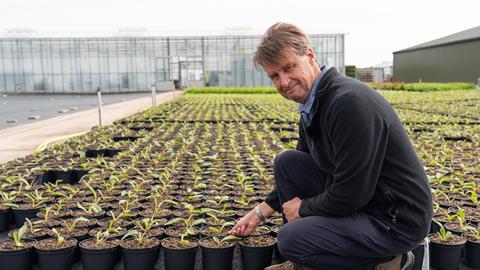Strategy sets out actions government should take to enable horticultural growth and deliver on Food Strategy pledge
Against the backdrop of empty supermarket shelves, the NFU has launched a strategy to increase British horticultural production.
If backed by government, the “enabling framework” would help minimise future supply chain disruption, the union claimed.
NFU Horticulture chair Martin Emmett said the report’s publication was not in direct response to the current shortages seen at UK supermarkets in a range of fresh produce. But he stressed that the current supply issues have shown that the government “must” now listen.
“The issue I’ve been trying to highlight is that we’re not in a position to make the best contribution that we could be from the UK supply base… You can’t rely just on overseas supply. The most appropriate strategy is to be able to grow as much as close to home as you can.”
The starting point for the new NFU report was the government’s Food Strategy, published in June 2022, which followed Henry Dimbleby’s independent review on the future of the UK’s food system.
“For too long, we’ve only had warm words from government about how important the horticulture sector is but no detail on how it wants to achieve growth,” said Emmett.
“Our strategy sets out the key cornerstones and actions government could take to enable growth for the sector, including incentives to promote investment in water infrastructure, long-term certainty on accessing seasonal labour, greater investment, and supportive national and local planning policy.
“The time to act is now. We need a government that champions UK horticulture and recognises the benefits that home grown fruit, veg, plants and flowers deliver for the economy, health and our environment, and with a plan to demonstrate a tangible commitment to growers.”
The NFU’s strategy sets out the top 10 policies that it believes will enable long-term production growth and shore up the supply of fresh produce to UK supermarkets. These are:
1. Access to labour
A minimum five-year rolling seasonal worker scheme, with “suitable” length visas; maintaining seasonal worker wages at the same level as the National Living Wage; and the removal of an “unrealistic” cap on worker numbers.
2. Access to affordable and sustainable energy supplies
Urgent recognition of energy-intensive horticulture sectors within the Energy and Trade Intensive Industries (ETII) scheme, and expansion of energy grid infrastructure to support investment in renewables.
3. Access to crop protection
An “enabling” crop protection policy that ensures the UK is not disadvantaged against its global competitors, plus securing the Extension of Authorisation for Minor Use (EAMU) programme beyond March 2023, previously funded by horticulture levies and run by AHDB.
4. Access to water
Since the sector is vulnerable to drought and the reduction or revocation of abstraction licences, greater investment is needed in infrastructure to collect, store and distribute water on farms and within and between regions.
5. Access to sustainable growing media
Industry and government collaboration to move towards peat-free production in an environmentally and commercially sustainable way. The NFU argues that a ban on the use of peat in commercial production is not the right approach.
6. Productivity investment
Ensuring that the UK’s Fruit and Vegetables Aid Scheme is more inclusive than the previous EU scheme and that there are no further delays in its development.
7. Enabling import controls for plants and plant products
Minimising the barriers and costs for importing plants and plant materials while maintaining biosecurity.
8. Fairness in the supply chain
Ensuring that growers can have open discussions and fair negotiations on cost price inflation with their customers.
9. Access to environmental funding schemes
Better recognition of horticulture in Ethe Environmental Land Management Sceheme and Countryside Stewardship Scheme to reflects the variety of growing systems across the sector.
10. An ‘enabling’ planning policy
Greater consistency in planning decisions to support, not restrict, horticultural companies’ ability to grow. This includes the provision of high quality, short-term accommodation for seasonal workers.
NFU President Minette Batters said: “We have an ambitious horticulture sector that wants to produce more of the fresh food the nation loves but this ambition needs the full support of government.
“The consequences of undervaluing growers can be seen on supermarket shelves right now. Shelves are empty. This is a reality we’ve been warning government about for many months.
“Without urgent action there are real risks that empty shelves may become more commonplace as British horticulture businesses struggle with unprecedented inflationary pressures, most notably on energy and labour costs.
“As outlined in our strategy, the horticulture sector can deliver more nutritious food, and growers are well placed to contribute to energy security for the nation and help to reach the industry’s net zero by 2040 target.”




